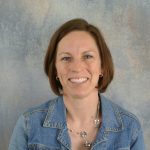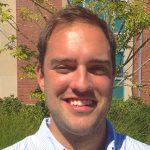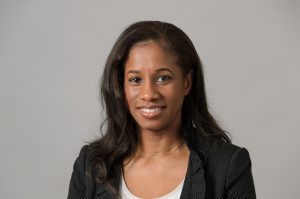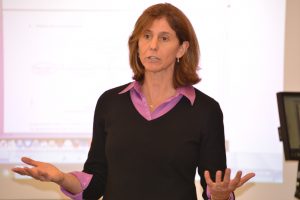
On the topic of community partnerships, Drs. Jennifer McGarry and Justin Evanovich strongly agree: relationships must be the priority. McGarry and Evanovich co-direct Husky Sport, a campus-community partnership between UConn’s Neag School of Education and a community in Hartford’s North End that uses sport and nutrition education to promote equity, empowerment, and growth, both for students in Hartford and at UConn.
The partnership as a whole, which has been going strong for nearly sixteen years now, has never been a “top-down” experience, says McGarry: “It has been community relationships from the beginning. It was never ‘this is what we do, can we do it at your school?’ It was getting to know kids, families, teachers and coaches in other spaces– in afterschool and weekend programs, in community sports– and starting from there. The partnership was built slowly and intentionally with the kids, the families, and eventually the teachers.”

Since 2005, the project has been generously grant-funded by the U.S. Department of Agriculture’s SNAP-Ed program, and currently Husky Sport is present in the North End of Hartford six days a week leading in-school, after-school, and weekend programming. While the in-school programming takes place at the Fred D. Wish Museum School, Husky Sport staff and students also lead programs at multiple after-school and weekend partner sites such as the Hartford Catholic Worker and Salvation Army North End Corps.
Partnerships such as this incorporate many different components, including research, but Evanovich emphasizes that research cannot be the core directive if equity is the goal. “Genuine community partnerships and research can easily be in conflict with one another,” he says. “We have to put relationships first, we can’t lead with research. If we did, we’d be putting the university, the college students, and the faculty at risk of being exploitative. We have to own that risk and actively fight against it, and that starts with valuing the voices of people in the community, with prioritizing their goals. We want quality experiences and opportunities to be there for the young people; if we’re not placing that first, we can lose the focus of what it is we’re trying to do.”
With this understanding in mind, the research that does take place within the Husky Sport program is carefully and intentionally facilitated. The research falls into three main areas. The first focuses on the Hartford students’ experience with the various Husky Sport programs, as well as the experience of their families, and uses a sport-based youth development framework. The second line of research focuses on the experience of UConn college student participants in a critical service learning framework. The final area focuses on the campus-community partnership itself, which is a topic of increasing interest in campuses and communities around the country. “The research, much like the partnership, is always evolving,” says McGarry. “With our college-student-focused research, for example, we used to use a service learning framework, but we’re now emphasizing more of a critical service learning approach. We hope this research impacts the way people understand and problematize service.”

Another important aspect of the partnership is internal assessment, an area in which Evanovich feels they have made great strides over the years. “Firstly, a lot of our ‘assessment’ is informal, it’s in our everyday relationships. Lots of exchanges of ‘how did it go, how did you like this, what would you like to see?’ It’s a process of analysis that’s part of the everyday fabric of our partnership,” says Evanovich. “And when we do conduct more formal assessment, we’ve made huge improvements. We try never to have students sit in their seats and complete a survey using a pencil. Everything’s active: it aligns with our Husky Sport pillars of activity. Everyone’s up and moving, placing stickers, competing in relay races– it’s fun and engaging.” Evanovich credits many of these improvements to the learning that took place during an exchange program between UConn and the University of Western Cape in South Africa. “Folks from UConn were able to go to communities in the Western Cape and see those techniques being implemented,” says Evanovich. “And we’re still growing: now we’re working on faster turnaround for change based on feedback from kids, teachers, and families.”
The partnership has faced its fair share of challenges since its inception in 2003. “Navigating changes that are out of our control can be difficult,” says McGarry. “Husky Sport is affected by shifts in leadership in the school, the university, the city, and even the state and federal governments. At one point, the school we had been at for about nine years closed, and then those students were reassigned to three different schools, and we had to split our program up among multiple locations. Then the following year, those students were shifted back into one school. It forces us to be creative; we changed our strategies and approaches and found ways to make things work. It can be challenging, but when we figure it out it can be very rewarding.”
Like any good partnership, Husky Sport is always a work in progress.
“We are always learning,” says Evanovich. “With everything we do, we can’t just be a university coming in from the outside as experts. The community we’re partnered with is within a six-block radius, and it’s full of love and care and skill and hard work, but it’s also systemically and historically oppressed. We can’t run disconnected youth development programs; we can’t talk about food that people can’t access, we can’t talk about sports that people can’t play. We have to make sure we prioritize the talents, the strengths, and the realities that the people in this community bring to the table every day.”
Looking ahead, McGarry and Evanovich hope to improve and expand the partnership while staying in the same community. They are currently in the conceptual stages of a partnership with Neag’s Integrated Bachelor’s/Master’s Teacher Education Program which would bring more Neag students to Fred D. Wish School, and they are also preparing for more change: the Wish School’s student body is about to grow, and it will shift from being a K-8 to a PreK-5 school. Both McGarry and Evanovich point to their fellow Neag faculty and staff as leaders in community-based research, partnership, and change. “We have many talented folks as colleagues,” says Evanovich. “Their ongoing support and collaboration is vital to Husky Sport.” The Department of Educational Leadership is proud to support Husky Sport’s work toward equitable, community-led, positive change in Hartford, Storrs, and beyond.

